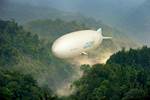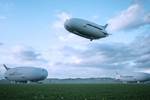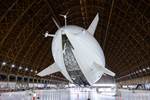Exel, Flying Whales advance airship R&D collaboration
This time, Exel has signed a contract to deliver 75 kilometers of pull-wound carbon fiber tubes for the LCA60T VTOL aircraft.
LCA60T airship application example. Source | Exel Composites
Since the annoucement of its R&D partnership with French-Canadian airship manufacturer and operator (Suresne) in May 2024, Exel Composites (Vantaa, Finland) has signed a significant contract to supply approximately 75 kilometers of pull-wound carbon fiber tubes. These tubes will form the first full structure of the LCA60T, Flying Whales’ airship designed to support cargo transport in remote areas.
The tubes will be manufactured at Exel’s Joensuu factory in Finland using aerospace-grade carbon fiber and epoxy resin, produced through its pull-winding technology. This continuous process ensures the tubes meet the required mechanical performance for aerospace applications while enabling high-quality serial production.
The 2024 announcement was in regards to Exel developing and prototyping the tubes. Under the terms of this newest agreement, Exel Composites will undergo a qualification process to ensure the carbon fiber tubes meet the stringent requirements for aeronautical applications. Deliveries are scheduled to begin by Q3 2025. While this contract marks the next phase of the companies’ collaboration, the value of the agreement has not been disclosed.
The LCA60T is a 200-meter-long vertical takeoff and landing (VTOL) airship that uses helium lifting technology to transport up to 60 tons of cargo. With a focus on sustainability, it combines eco-design and life cycle efficiency to minimize environmental impact and reduce CO2 emissions. Functioning as an airborne crane, the LCA60T will reduce reliance on traditional transport methods and help ease congestion at shipping ports.
“Working with Exel Composites has been a great journey,” says Vincent Guibout, CEO of Flying Whales. “Its expertise in pull-winding technology and its ability to meet our rigorous specifications have been crucial in bringing the LCA60T airship to life.”
Related Content
-
Plant tour: Hexagon Purus, Kassel, Germany
Fully automated, Industry 4.0 line for hydrogen pressure vessels advances efficiency and versatility in small footprint for next-gen, sustainable composites production.
-
ECOHYDRO project to enable recyclable composites for hydrogen storage
With the involvement of two schools from the Institut Mines-Télécom, the 4-year project aims to improve the intrinsic properties of a composite material based on Elium via four concrete demonstrators.
-
Post Cure: Parallel winding technique demonstrates CFRP anisogrid design optimization
Over the years, CIRA has demonstrated its patented CFRP parallel winding technique in a variety of ways for space applications. The lattice structure for the Vega-C launcher stage is a prime example.






